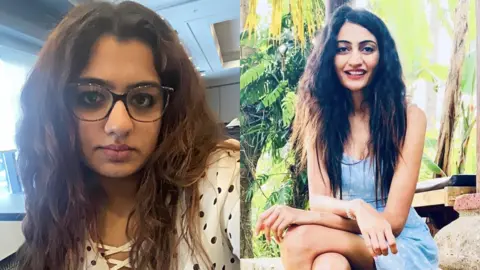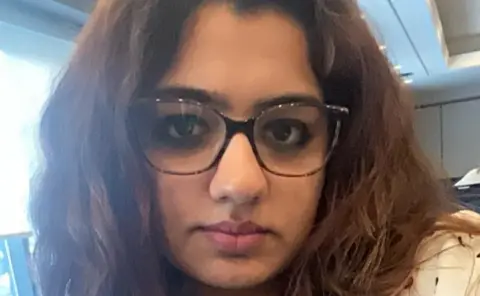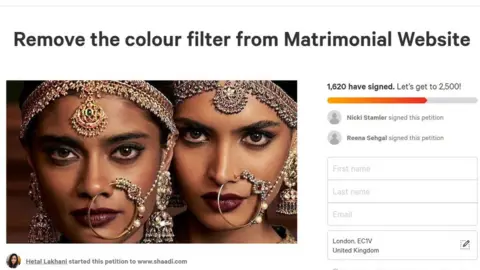Shaadi.com: Dating site removes skin tone filter after backlash
 Meghan/Hetal
Meghan/HetalAsian marriage website, Shaadi.com, has removed a skin tone filter following pressure from users.
Hetal Lakhani from Dallas, USA, started an online petition against the option, which led to the company removing it.
She started it after speaking to another user, who questioned the filter in light of anti-racism protests.
Shaadi.com says the filter "was not serving any purpose" and was a "product debris we missed removing".
When users joined the site they were asked to select how dark or light their skin is under the 'skin tone' option.
Users could search for potential partners by the skin tone they'd selected, but Shaadi.com claims this filter didn't work and searches would show all matches of all skin tones.
The website is unique to other dating sites because it replaces south Asian tradition of a matchmaker and helps people intending to get married find a spouse.
 Meghan
MeghanMeghan Nagpal was using the website to find a potential life partner who would also be of Indian origin.
"I emailed them (shaadi.com) and one representative said this is a filter required by most parents," she tells BBC Asian Network.
She discussed the complexion filter on a Facebook group, where Hetal is also a member.
'I was really shocked'
"When Meghan shared this on our group I was really shocked because a company usually has a social responsibility," says Hetal.
"I wanted to tackle this in a way that could make a difference so I started a petition.
"And it just took off like wildfire. Within 14 hours we had over 1,500 signatures. People were so glad we were raising the issue."
 change.org
change.orgThe petition was shared with Shaadi.com by a blogger knows as Miss Roshni who runs an entertainment website, Urban Asian. She challenged the company for their response to Meghan and described the skin tone filter as "disrespectful" and "disgusting".
Shaadi.com claimed it was "blindspot" they had missed on their site and the filter was removed overnight.
"It's just one small step in an ultimate goal of promoting equality within the south Asian community on a global level," said Meghan.
Hetal added: "I have my bachelors, I have my masters. But if a skin tone can take that away from me - that would be the worst."
Colourism in South Asia
Colourism in South Asia has come under the spotlight following global anti-racism protests after the death of George Floyd.
Indian film actors have also been criticised
"Bollywood stars were on one hand endorsing fairness creams but on the other hand were supporting the Black Lives Matter movement," said Meghan.
"So a part of me was thinking there is obviously a mindset within the south Asian culture about fair skin being better, and that's spilling over into matrimonial websites.
"You hear it more when older people in our community are commenting about women rather than men; saying 'she is so fair, she is so beautiful' and I think it's more of an unconscious bias."
 Hetal
HetalHetal says a company with international reach should be more responsible.
"People have their biases. But a company should not inculcate that culture."
The Director of Marketing at Shaadi.com told BBC Asian Network: "We truly believe that love comes in all shapes and shades.
"And we are proud to represent a cross-section of India - that's something very few companies in India can boast about."
I selected 'wheat-ish'
Priya (name has been changed) found her husband on the site after being rejected by others for her skin colour.
"I am dark-skinned and saw the skin colour question on there (shaadi.com) and answered it the best I could," she tells BBC Asian Network.
"I remember selecting 'wheat-ish' - whatever that means."
"My mother-in-law was dead against our marriage because I was a lot darker than her fair skinned, handsome son. Her generation view beauty in shades, which I have hated my entire life.
"I can't change my skin tone and it hurts."


